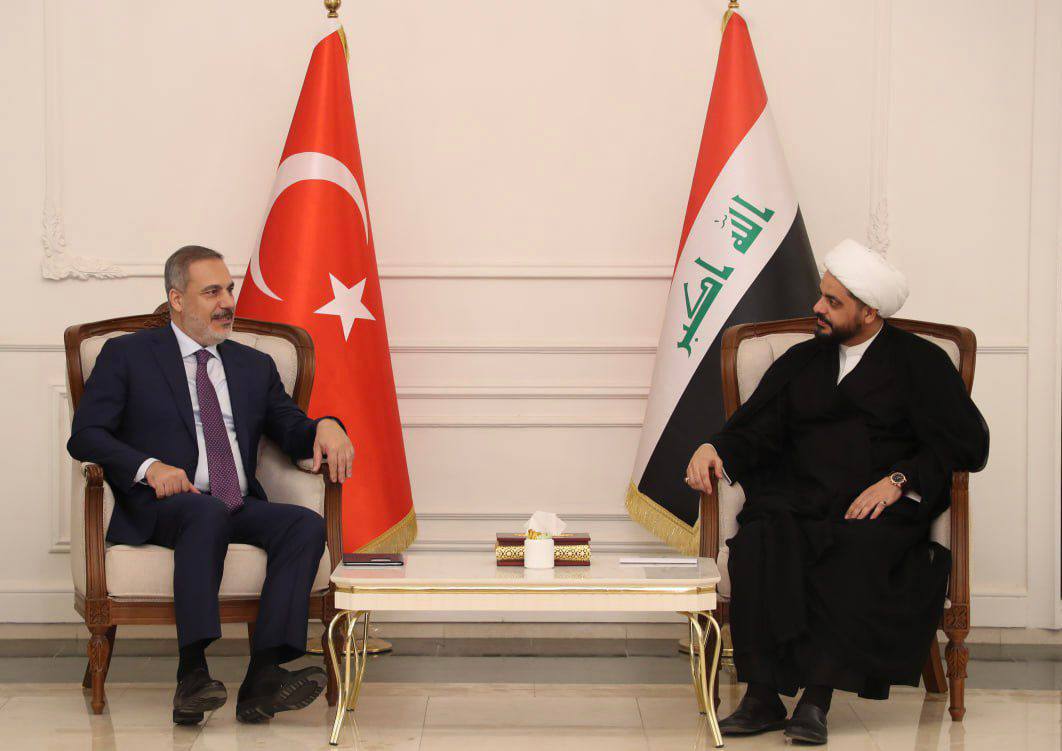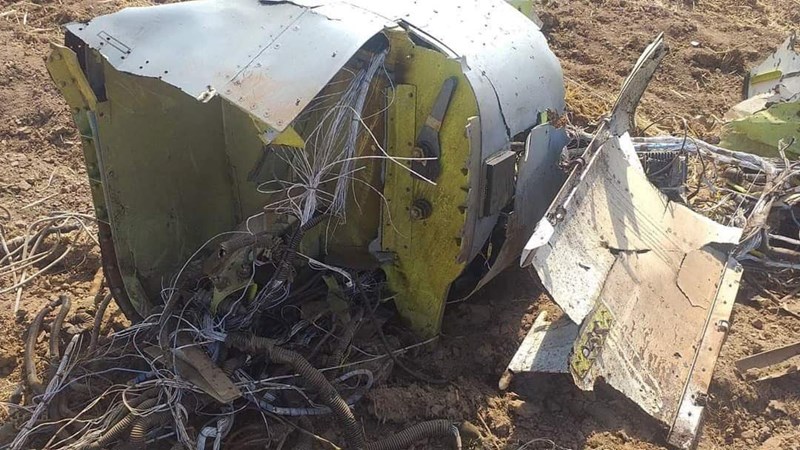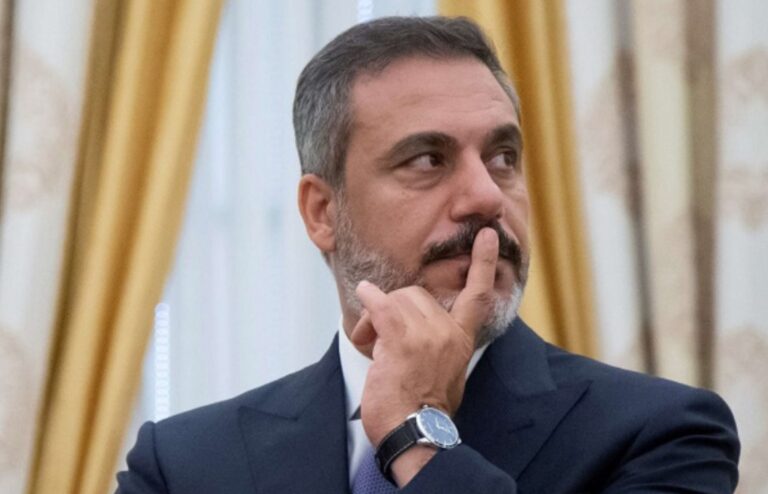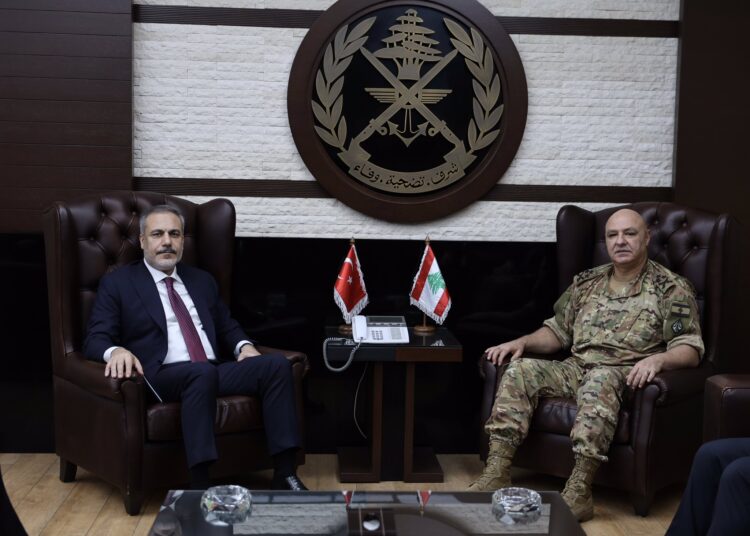Levent Kenez/Stockholm
Hakan Fidan, who led Turkish intelligence for 13 years, was appointed foreign minister by President Recep Tayyip Erdogan on June 3. But he seems to be having a bit of a rocky start in his new role. Instead of talking about diplomacy, he’s been using a lot of military and intelligence language. Furthermore, his conduct during official visits to foreign countries has been notably unconventional for a foreign minister. Fidan also brought some top intelligence officials into his new office, which is not how things are usually done in the foreign ministry.
Fidan’s stern attitude in international meetings and press conferences, his reliance on reading from scripts, his refusal to accept questions from journalists and his practice of only responding to pre-submitted queries have also garnered attention.

The first sign that Fidan’s habits from his previous role would continue in the new one came during a visit to Iraq in August. The undisclosed meeting between Fidan and Qais Al-Khazali, leader of the Iran-backed Shiite militia Asa’ib Ahl al-Haq, raised significant concerns and criticism. Khazali was designated by the US Department of the Treasury due to his involvement in serious human rights abuses. According to the Treasury, Khazali played a prominent role in a 2007 attack that resulted in the death of five US soldiers. By failing to report on this controversial meeting and omitting it from the official records, Ankara created a veil of secrecy around a meeting that involved a designated terrorist leader. This left many questioning the transparency and intentions of Turkish foreign policy, particularly in regard to its interactions with individuals and groups with known links to violence and terrorism. Furthermore, it was reported in the Turkish media that the meeting, which took place in Al-Khazali’s office, was also considered inappropriate protocol-wise.
On October 1, following a bomb attack on the Turkish Ministry of Interior Affairs building by the outlawed Kurdistan Workers’ Party (PKK) Fidan made a statement during a press conference on October 4 in which he asserted that all infrastructure and superstructure targets under the control of the PKK in northern Syria were considered legitimate targets by the Turkish military. Fidan’s statement included a warning: “I advise third parties to stay away from these areas. Our security forces will respond with great force.” These remarks were clearly a message and a threat to the US, whose military bases in the region were indirectly referenced. The following day, US F-16 fighter jets shot down a Turkish drone operating in Syria. The Pentagon spokesperson claimed that the Turkish UAV had entered a limited operation area declared by the US and further said commanders assessed that the UAV, which had approached within 500 meters (yards) of US forces, posed a potential threat and that US F-16 fighter jets shot it down in self-defense.

A statement released by the Turkish Ministry of Foreign Affairs said, “Necessary measures are being taken to ensure a more effective operation of the deconfliction mechanism with the relevant parties.” Observers interpreted this as a step back from Fidan’s previous position, and they viewed Fidan’s military-related statements as complicating the ministry’s work.
Fidan’s meeting with Gen. Joseph Khalil Aoun, commander of the Lebanese Armed Forces, in Beirut on October 17, was also considered a non-standard meeting. A former diplomat contacted by Nordic Monitor said the meeting was unquestionably against diplomatic norms. Furthermore, the diplomat noted that Fidan’s actions gave the impression that he had not yet shed his previous role as head of Turkish intelligence agency MIT, which is not in line with established practice in Turkey.
On October 19, in an interview given to journalists, Fidan delivered a striking message, one that was repeated verbatim by all pro-government media outlets. He emphatically expressed his opposition to the Abraham Accords, a series of agreements signed between Israel and United Arab Emirates and Bahrain. In Fidan’s view, these accords paint a picture in which Israel’s relations with Arab nations are normalizing, as a result leading to the diminishing importance of the longstanding Palestinian issue.
Fidan revealed that he posed a fundamental question to the representatives of the Arab countries involved in these agreements, asking what kind of contribution these accords would make to the Israeli-Palestinian conflict. He relayed that their response typically centered around the idea that “This way, we’ll have a lever to at least engage with Israel, apply pressure.” However, in the interview, Fidan made clear that, in his view, these agreements do little more than delay or alter the nature of the Palestinian problem
During the interview Fidan referred to the Palestinian issue as a game where everyone deceives each other. He also made a veiled threat, saying, “If Turkey does not react, the Turkish people’s reaction may head in different directions.” Last week, during protests held in front of Israeli and American diplomatic missions in Turkey, demonstrators attempted to breach security and enter the buildings. As a result, the United States closed its consulate in Adana indefinitely, and Israel issued an order for all diplomats to leave the country.

Nordic Monitor previously published that appointments within the Turkish Ministry of Foreign Affairs have raised concerns. One of the most attention-grabbing names in the latest round of appointments is Nuh Yılmaz, former press counselor and head of the counterintelligence section at MİT, the Turkish intelligence agency. Yılmaz, rumored to become a deputy minister, has been named head of the Center for Strategic Research (SAM) within the ministry. This appointment is seen as symbolic, signifying his continued close association with Fidan’s inner circle. Yılmaz has a history of managing agents and informants in traditional Turkish media outlets and online news websites, with some engaging in the dissemination of conspiracy theories.
Additionally, Ümit Ulvi Canik, formerly MİT’s legal counselor, has been appointed to the Directorate General of Legal Services at the Ministry of Foreign Affairs. Canik was previously embroiled in a scandal related to the interception of a truck loaded with arms and ammunition in 2014, allegedly destined for al-Qaeda groups in Syria. Canik had represented MİT in various legal cases and played a role in obstructing the search of the truck.
Hacı Ali Özel, formerly a deputy to Fidan, has been assigned as director general of personnel. His return to the ministry signals Fidan’s efforts to assemble a team aligned with his goals, as the Erdogan government has removed around 30 percent of the total diplomatic staff, more than 700 employees, including veteran ambassadors, from the ministry since 2016. Many were unjustly imprisoned. A large number of the open positions were then occupied by loyalists, supporters and politically appointed individuals who were not career diplomats.
Gürsel Dönmez, who previously collaborated with Fidan at MİT, has been appointed Fidan’s chief advisor. Dönmez, who led the Austrian branch of the Union of International Democrats (UID) and served as an initial vice president of the Presidency of Turks Abroad and Related Communities (YTB), is known for his involvement with diaspora communities in Europe, a recruitment strategy employed by Turkish intelligence agency.
A critical appointment is that of Fatma Ceren Yazgan, a former ambassador to Georgia, who will lead the ministry’s Security and Research Directorate. Her past role in collaboration with MİT to profile and identify diplomats who were ousted in 2016 suggests a willingness to engage in various operations to demonstrate loyalty to Fidan and President Erdogan.
These appointments indicate Fidan’s swift moves to transform the Ministry of Foreign Affairs into an extensive intelligence tool within President Erdogan’s arsenal, similar to his approach when he assumed the role of MİT chief in 2010, turning the agency into an asset for furthering Erdogan’s agenda.












